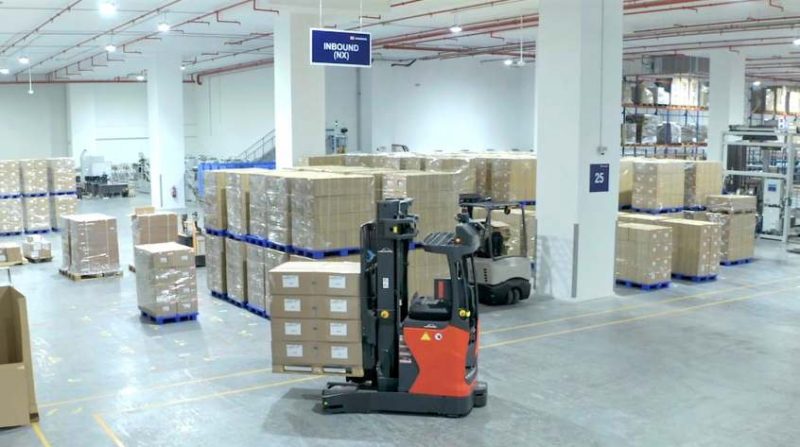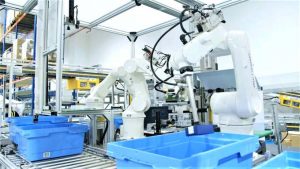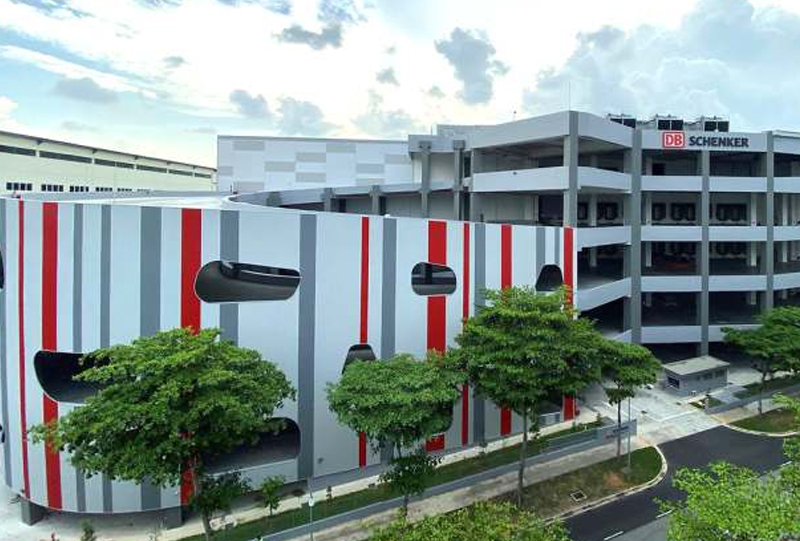DB Schenker roars in Asia-Pacific with the 'Red Lion'
Its new five-floor regional high-speed logistics hub in Singapore costs EUR101 million, the largest investment in Schenker’s history. It’s fully equipped with the latest automation technology and provides first-class logistics services, including 3D robotic labeling system in multiple languages
 B Schenker, the world’s largest logistics provider, marked another milestone in the global transport industry when it unveiled last month its new five-story regional high-speed logistics hub in Singapore known as the “Red Lion.”
B Schenker, the world’s largest logistics provider, marked another milestone in the global transport industry when it unveiled last month its new five-story regional high-speed logistics hub in Singapore known as the “Red Lion.”
The opening of this facility, one of the few large-scale integrated air freight and contract logistics hubs in the world, coincided with the 50th anniversary of DB Schenker’s operations in the Lion City, which is one of the most important logistics hubs in the Asia-Pacific Region (APAC).
Schenker’s first branch in Singapore was set up in 1970. Since then, the business has seen tremendous growth, with the number of locations in the city state rising to 13, including DB Schenker’s regional head office for APAC.
Huge investment
Worth EUR101 million, the Red Lion warehouse is strategically located in the Airport Logistics Park of Singapore (ALPS) at Changi Airport, the site sets a new standard in combining the world’s most advanced technological developments with the highest levels of sustainable warehouse management for its customers.
“DB Schenker further strengthens its position among the world’s leading logistic service providers for the APAC region. Our new logistics hub makes us even faster and more reliable for our customers. The record investment in Red Lion marks an unparalleled milestone for our corporate history of almost 150 years. We are happy and proud to reinforce our commitment to Singapore as the heart of our logistics operations in Asia,” said Jochen Thewes, DB Schenker’s Chief Executive Officer.
Red Lion solidifies Schenker’s position in Singapore as the largest and most advanced third-party logistics provider in the ALPS.
Combined, the mechanized air freight hub and contract logistics warehouse extend over 51,400 square meters on five floors, equal to the size of seven soccer fields.
Innovative & futuristic
A next generation Warehouse Management System and a synchronized IT platform bridging the various automations enable Red Lion to increase warehouse productivity by up to 100% compared to manual processes, and to reduce lead time for customers by 40% compared to non-integrated facilities.
Incoming freight is processed through a ball deck, which increases speed and eases handling. Pallet lifters then move freight to the automated warehouse with Very Narrow Aisles (VNA) to optimize capacity. The multi-shuttle and carton live storage systems are complemented by Goods-to-Person (GTP) and Pick-To-Light technologies, conveyor systems, and Automated Guided Vehicles (AGVs).
 Red Lion is also the first warehouse to offer an in-house designed robotic labeling system, which utilizes 3D-vision technology and three robotic arms to apply labels in multiple languages on products of varying sizes, shapes, and configurations.
Red Lion is also the first warehouse to offer an in-house designed robotic labeling system, which utilizes 3D-vision technology and three robotic arms to apply labels in multiple languages on products of varying sizes, shapes, and configurations.
“Our new warehouse is a record-breaking facility full of technological and digital innovations. It is designed to serve customers with requirements for short lead times and high throughput. Our robotics will revolutionize product labelling. With our automation novelties, we are paving the way for our continuous journey in contract logistics toward a fully digital supply chain,” said David Christmas, APAC Contract Logistics Board Member at DB Schenker.
Moreover, the building recognizes Schenker’s commitment to promote sustainable development and environmental protection. 1,440 photovoltaic solar panels, along with other sustainability features, enable energy savings of 34%. Thus, Red Lion is certified with the Green Mark Platinum label by the Building and Construction Authority (BCA) in Singapore as well as the LEED Gold Standard.
DB Schenker, a division of the German rail operator Deutsche Bahn AG, said Schenker Singapore meets changing customer demands in the evolving logistics landscapes through innovations, consistency in quality, and competences in key sectors such as semiconductor, healthcare, aerospace, high-tech and consumer goods. (Photos & Text Source: www.dbschenker.com)
APAC: Fastest growing region in the world
With 4.5 billion people or more than 60 percent of the world’s population located in Asia-Pacific, many of which home to the emerging middle-class, the region is forecast to post the strongest economic growth in the coming years.Despite the pandemic, the region is showing resiliency and recovery, that could spell more business activities in the future.
Singapore, one of the world’s strongest economies, has long recognized the importance of logistics in facilitating economic growth. Before the pandemic, experts forecast the global logistics market to grow by over 7 percent through 2022, largely driven by the rapid growth in the e-Commerce retail industry.
According to Research and Markets, the global logistics market size is projected to grow from USD 2,734 billion in 2020 to USD 3,215 billion by 2021, at a Y-O-Y of 17.6%, in the post COVID-19 era.
The major drivers of this market are increasing focus on the continued supply of essential commodities, creation of supply chain stabilization task force to fight COVID-19, and growing demand and distribution of personal protective equipment, the research intelligence firm added. Fast-moving consumer goods (FMCG) and healthcare products will dominate the logistics market.


